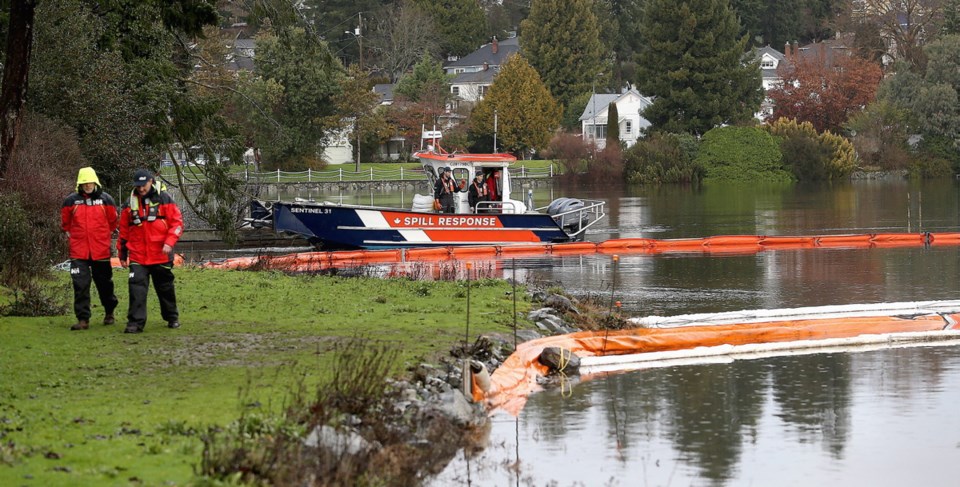A residential heating-oil tank has been confirmed as the source of a fuel spill that’s been contaminating sensitive ecosystems in Gorge Creek for the past week.
Esquimalt announced late Friday afternoon that the tank leaked oil into both the ground and the stormwater system.
“The tank has been disconnected from the system to prevent further spills, and staff are in the process of taking the next steps with the homeowner,” the township said.
Esquimalt added that its staff is working with the Capital Regional District’s source-control program to make sure there are no other spills contributing to the problem.
The announcement came just hours after Esquimalt Mayor Barb Desjardins issued a plea for residents to check their oil tanks for any signs of leakage.
At the time, fuel was still entering the tidal creek that runs beside Esquimalt Gorge Park and is home to migratory birds, coho salmon, herring and other wildlife.
“It’s not getting better,” Desjardins said. “It’s continuing, which is the challenge.”
The official response to the spill appeared to intensify Friday morning, nearly a week after it was first reported to the provincial hotline last Saturday.
Federal, provincial, township and Capital Regional District officials were all at the scene, as were marine-spill and hazardous-materials experts that Esquimalt hired to assist with the cleanup. Larger booms were strung across the creek and absorbent materials dotted the reeking waterway.
Yogi Carolsfeld, executive director of the World Fisheries Trust, expressed frustration at the length of time it took for governments to ramp up their containment efforts.
“I think the response has been totally crazy,” he said. “I mean, now today, we see a bit of collaboration from other expertise in controlling the spill. But it’s been a week.”
He acknowledged the difficulties with finding the source. “But containing the spill within the creek and sucking the oil out, that shouldn’t be so hard,” he said. “We’ve certainly got better booms in place now, but why didn’t that happen earlier?”
Carolsfeld noted that pipeline proponents often claim the region has the best spill response in the world.
“So where is it when the spill happens?” he said. “Either Esquimalt needs to be prepared to call in these folks, or there needs to be some agreement, so that when a spill happens, everyone is there independent of where the money eventually comes from.”
Desjardins was unable to estimate the cost of the cleanup, which has been complicated by high tides and heavy rain.
“At this point, we’re trying to identify it, stop it, clean it and all of the other stuff will come along,” she said.
“It’s tragic. Esquimalt has done so much. We were very much in the forefront of leading the way with ensuring that buried oil tanks were identified and were being taking care of. And we’ve been on the forefront of cleaning up the Gorge.
“So when we have something like this, it’s of significant concern and sad. But we’ve got to put aside that emotion and do what we can to resolve it.”
Jacques Sirois of the Friends of Victoria Harbour Migratory Bird Sanctuary said he was glad to see so many officials on the ground Friday.
“For some reason, this morning, everybody is here,” he said. “It’s fantastic. I’ve never seen this before. We’ve entered a new era, it seems.”
He said Gorge Creek represents a critical part of the Victoria Harbour Migratory Bird Sanctuary that was created in 1923 to curb the hunting of birds. A Capital Regional District report says the sanctuary includes 1,840 hectares of marine and estuarine waters and provides habitat for rare and endangered plants and wildlife.
How they will be affected by the spill remains unknown.
“We haven’t found a dead bird here,” Sirois said. “But we’ve got herring in the Gorge Waterway. We’ve got salmon. We’ve got Olympia oysters. And the oil is flowing over them — so not that great of a scenario.”
B.C.’s Environment Ministry said it has been in contact with Environment Canada and Esquimalt about the potential impacts to wildlife.
“There has been wildlife observed within the area, however no wildlife have been observed to be in distress,” the ministry said.
Esquimalt said that if visitors to the park notice an animal in distress, they should call Wild Arc at 1-855-622-7722.



